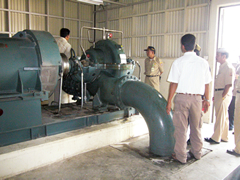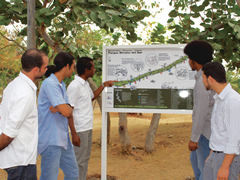Post-Project Support
Cooperation projects conducted by JICA are completed after a predetermined period of time. JICA carries out ongoing monitoring after a project has ended to assess the partner country's self-help efforts in maintaining and enhancing the results of the project. JICA also provides indirect support and supplementary support when necessary. Such support is referred to as "Follow-up Cooperation," which may be broadly divided into two categories.
(1) Follow-up Cooperation to Solve Problems with Facilities and Equipment
This type of cooperation involves working with the partner country to solve problems that may have arisen with facilities constructed by or equipment provided through Japan's cooperation projects. Such problems can occur owing to a variety of factors, including damage caused by natural disasters or a shortage of financial or technical resources in the partner country necessary for keeping the facilities or equipment operating effectively.

Inspection of a generator
For instance, in 1999 a small 250kW hydropower generating plant was constructed with Grant Aid in Rerebe Village in Gayo Lues Regency in Aceh Province, Indonesia, and this facility provides electric power to around 800 surrounding households. After completion of the facility, the village cooperative association managed the operation and maintenance of this generating plant. However, 10 years after the start of operation, the water turbine generator and electricity distribution lines became decrepit and rehabilitation was necessary. However, the economic situation in the region deteriorated owing to a decline in the number of residents due to a worsening of public security accompanying conflict in Aceh in addition to rising prices following an economic crisis and the adverse impact of the Sumatra earthquake. Due in part to these factors, the village was continually unable to cover the cost of rehabilitating the power generating plant only with electric power usage fees collected from residents.
In response, as Follow-up Cooperation, JICA offered support for rehabilitation of the power plant and provided the local provincial government with proposals for building a proper business management and maintenance management structure. This support enabled the power plant to continue to be used in the future and thereby ensure stable supplies of electricity to residents.
(2) Follow-up Cooperation to Expand Project Benefits
Another type of Follow-up Cooperation is the provision of additional support to the partner country to add new value to a completed project or training program, thereby expanding the benefits that will accrue from a project.
For example, in Afghanistan, which is facing a chronic shortage of doctors to provide basic healthcare and medical services, JICA implemented the Medical Education Project, a three-year Technical Cooperation project running from 2005 to 2008, at Kabul Medical University (KMU) in the nation's capital. Under this project, JICA strengthened the functions of KMU's Education Development Center (EDC), which is responsible for developing curriculum and study materials, devising instruction methods and cultivating teaching staff. This project contributed especially to the establishment of a medical education system suited to Afghanistan as well as fostering of general practitioners capable of making comprehensive diagnoses based on extensive knowledge of a variety of illnesses.
To expand the benefits of this project, JICA carried out Follow-up Cooperation in 2009. Specifically, JICA brought together instructors from six universities in provincial areas for a two-day workshop, with staff from the EDC and university instructors serving as lecturers. JICA encouraged the active participation of KMU staff at the workshop and emphasized self-initiative on the part of the university.
In conjunction with the holding of this workshop, JICA dispatched instructors from Japan to provide support from expert viewpoints. By doing so, JICA provided advice and analyzed the current state of various issues such as for improving education quality, evaluating and improving the instructors who will be responsible for the independent operation of the university following the conclusion of the project and for strengthening the functions of the EDC.

A map installed inside Mirador del Sur Park
JICA Osaka provided a training course in "Urban Greenery and Park Administration" mainly for government administrators involved in related measures and policies. This course comprised lectures, observation tours and practical training concerning urban greening, landscape preservation and urban parks. After returning to the Dominican Republic, a participating government administrator from the Environment Management Department of the municipal government of the City of Santo Domingo in the Dominican Republic is continuing to undertake initiatives that utilize the results of this training in overall environmental management.
This same returning trainee is cooperating with local NGOs and colleagues who operate an environmental information center in Santo Domingo in the launch of an environmental education project in the lush green Mirador Sur Park, which is a forested area situated next to high-rise buildings in the southern part of the city. This project involves the creation of maps that serve as park guides, pamphlets that explain plants and animals and a book about the park's history and nature. Additionally, seminars are held to promote a deeper understanding of the environment among park visitors, guideboards have been set up to explain the various animals inhabiting the park and walking courses have been created for allowing people to observe nature, all of which make the park an optimal venue for environmental education. This project has changed people's environmental awareness, as exemplified by a participant in the seminar, who remarked, "I now realize the importance of protecting the environment, and I hope that these activities will be beneficial for our future."




scroll